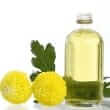Background
- Two parts of the safflower are primarily used: the flower itself and safflower seeds. There are two types of safflower oil with corresponding types of safflower varieties: those high in monounsaturated fatty acid (oleic) and those high in polyunsaturated fatty acid (linoleic). Currently, the seed varieties that produce oil high in oleic acid and very low in saturated fatty acids predominate in the United States market. High oleic safflower oil is lower in saturates and higher in monounsaturates than olive oil.
- In the U.S. diet, safflower oil has been frequently substituted for oils with higher saturated fat content, as monounsaturated fat may have a beneficial effect on the risk of coronary heart disease.
- Some clinical studies have shown that safflower oil supplementation may be helpful in patients with cystic fibrosis, Friedreich's ataxia, and neurotoxicity from lithium. However, more study is needed in these areas before a firm conclusion can be drawn.
- In traditional Chinese medicine, safflower is used to invigorate the blood, dissipate stasis, amenorrhea (absence of menstruation), pain, and traumatic injuries. It is also used to "calm" a live fetus and abort a dead fetus, and is therefore used cautiously during pregnancy.
References
Natural Standard developed the above evidence-based information based on a thorough systematic review of the available scientific articles. For comprehensive information about alternative and complementary therapies on the professional level, go to . Selected references are listed below.
- Axelrod L, Camuso J, Williams E, et al. Effects of a small quantity of omega-3 fatty acids on cardiovascular risk factors in NIDDM. A randomized, prospective, double-blind, controlled study. Diabetes Care 1994;17(1):37-44.
View Abstract - Burton-Freeman B, Davis PA, Schneeman BO. Interaction of fat availability and sex on postprandial satiety and cholecystokinin after mixed-food meals. Am J Clin Nutr 2004;80(5):1207-1214.
View Abstract - Clore JN, Stillman JS, Li J, et al. Differential effect of saturated and polyunsaturated fatty acids on hepatic glucose metabolism in humans. Am J Physiol Endocrinol.Metab 2004;287(2):E358-E365.
View Abstract - Dworatzek PD, Hegele RA, Wolever TM. Postprandial lipemia in subjects with the threonine 54 variant of the fatty acid-binding protein 2 gene is dependent on the type of fat ingested. Am J Clin Nutr 2004;79(6):1110-1117.
View Abstract - Eyjolfson V, Spriet LL, Dyck DJ. Conjugated linoleic acid improves insulin sensitivity in young, sedentary humans. Med Sci Sports Exerc 2004;36(5):814-820.
View Abstract - Gradek WQ, Harris MT, Yahia N, et al. Polyunsaturated fatty acids acutely suppress antibodies to malondialdehyde-modified lipoproteins in patients with vascular disease. Am J Cardiol 4-1-2004;93(7):881-885.
View Abstract - Kaji K, Yoshida S, Nagata N, et al. An open-label study of administration of EH0202, a health-food additive, to patients with chronic hepatitis C. J Gastroenterol. 2004;39(9):873-878.
View Abstract - Loo WT, Cheung MN, Chow LW. The inhibitory effect of a herbal formula comprising ginseng and carthamus tinctorius on breast cancer. Life Sci. 11-26-2004;76(2):191-200.
View Abstract - Nordstrom DC, Honkanen VE, Nasu Y, et al. Alpha-linolenic acid in the treatment of rheumatoid arthritis. A double-blind, placebo-controlled and randomized study: flaxseed vs. safflower seed. Rheumatol.Int. 1995;14(6):231-234.
View Abstract - Park Y, Jones PG, Harris WS. Triacylglycerol-rich lipoprotein margination: a potential surrogate for whole-body lipoprotein lipase activity and effects of eicosapentaenoic and docosahexaenoic acids. Am J Clin Nutr 2004;80(1):45-50.
View Abstract - Radack K, Deck C, Huster G. The effects of low doses of n-3 fatty acid supplementation on blood pressure in hypertensive subjects. A randomized controlled trial. Arch Intern Med 1991;151(6):1173-1180.
View Abstract - Rallidis LS, Paschos G, Papaioannou ML, et al. The effect of diet enriched with alpha-linolenic acid on soluble cellular adhesion molecules in dyslipidaemic patients. Atherosclerosis 2004;174(1):127-132.
View Abstract - Simopoulos, AP. Omega-3 fatty acids and antioxidants in edible wild plants. Biol Res 2004;37(2):263-277.
View Abstract - Wilt TJ, Lofgren RP, Nichol KL, et al. Fish oil supplementation does not lower plasma cholesterol in men with hypercholesterolemia. Results of a randomized, placebo-controlled crossover study. Ann Intern Med 12-1-1989;111(11):900-905.
View Abstract - Zhang Q, Peng JH, Zhang XN. [A clinical study of Safflower Yellow injection in treating coronary heart disease angina pectoris with Xin-blood stagnation syndrome.]. Chin J Integr.Med 2005;11(3):222-225.
View Abstract







